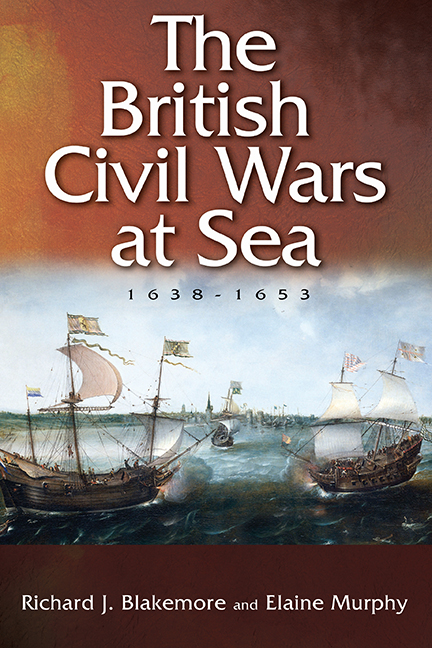Book contents
- Frontmatter
- Dedication
- Contents
- List of Illustrations
- Preface and Acknowledgements
- List of Abbreviations
- Map
- Introduction
- 1 Warfare at Sea in the Early Modern Period
- 2 The Outbreak of War, 1638–1642
- 3 The War at Sea, 1642–1646
- 4 Parliament's Navy, 1642–1646
- 5 Royalist, Confederate, and Scottish Naval Efforts, 1642–1653
- 6 Revolution, 1647–1649
- 7 Conquest, 1649–1653
- Conclusion
- Appendix 1 Timeline of the Civil Wars at Sea, 1638–1653
- Appendix 2 Parliamentarian Fleets, 1642–1649
- Bibliography
- General Index
- Index of Ships
5 - Royalist, Confederate, and Scottish Naval Efforts, 1642–1653
Published online by Cambridge University Press: 19 July 2019
- Frontmatter
- Dedication
- Contents
- List of Illustrations
- Preface and Acknowledgements
- List of Abbreviations
- Map
- Introduction
- 1 Warfare at Sea in the Early Modern Period
- 2 The Outbreak of War, 1638–1642
- 3 The War at Sea, 1642–1646
- 4 Parliament's Navy, 1642–1646
- 5 Royalist, Confederate, and Scottish Naval Efforts, 1642–1653
- 6 Revolution, 1647–1649
- 7 Conquest, 1649–1653
- Conclusion
- Appendix 1 Timeline of the Civil Wars at Sea, 1638–1653
- Appendix 2 Parliamentarian Fleets, 1642–1649
- Bibliography
- General Index
- Index of Ships
Summary
Naval warfare during the civil wars mirrored the complex military situation on land in many respects. The activities of multiple naval forces, and shifting alliances between them, can make it difficult to follow the course of the conflict at sea. As we saw in the previous chapter, parliament controlled the largest navy in the three Stuart kingdoms, but its dominance at sea did not go unchallenged. The king and his supporters set out shipping in England, Ireland, and Scotland, while both the Irish confederates and the Scottish covenanters authorised privateers to sail in support of their causes. The ad hoc nature of the creation and operation of these forces meant that they all faced similar problems. These included fluctuations in strength, an overreliance on merchantmen or privately-owned warships, shortage of facilities ashore, and a lack of centralised control and administration. Historians trying to reconstruct their activities must also take into account the limitations of the surviving archival records: in particular, much of what we know of the naval activities of the royalists and confederates during the 1640s and 1650s comes from hostile parliamentarian sources. This chapter seeks to unravel these sources, to outline the activities of these naval forces, and to assess how they overcame the problems they faced in order to mount a challenge to parliamentarian naval power. It is worth noting that confederate and royalist naval efforts were larger and more sustained throughout the war than those in Scotland. The ‘limited naval policy’ adopted by the covenanters for much of the conflict, combined with the poor survival of admiralty records, makes assessing maritime activity in seas around Scotland less straightforward than it is for other regions.
Royalists
Edward Hyde, first earl of Clarendon, in the famous History of the Great Rebellion, described the desertion of the navy to parliament in 1642 as an ‘unspeakable ill consequence to the King's affairs’. On a number of levels the loss of the fleet impacted on the royalist war effort. Without men-of-war at his disposal, Charles I lacked the ability to contest parliamentarian control of important ports and shipping routes; this meant his overseas trade and communications became vulnerable to interception, while at the same time the king could do little to hinder parliamentarian shipping.
- Type
- Chapter
- Information
- The British Civil Wars at Sea, 1638–1653 , pp. 108 - 128Publisher: Boydell & BrewerPrint publication year: 2018

